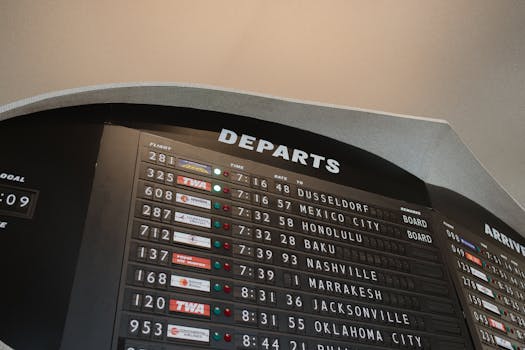
**
US Airlines Sharing Passenger Data with CBP: What You Need to Know About Privacy Risks
Air travel in the US is about to become even more transparent. Recent reports reveal that US airlines are increasingly sharing vast amounts of passenger data with Customs and Border Protection (CBP), raising serious concerns about passenger privacy and data security. This practice, while seemingly routine, has significant implications for travelers' personal information, highlighting the need for greater transparency and stricter regulations. This article delves into the details of this data sharing, its potential consequences, and what you can do to protect your personal information when flying domestically.
The Scope of Data Sharing: Beyond the Basics
The data shared isn't limited to the basic information you provide during booking. While your name, date of birth, and contact details are certainly included, the scope extends far beyond these fundamentals. Airlines are reportedly transmitting:
- Frequent flyer program information: This includes your membership number, tier status, travel history within the airline’s network and potentially purchase history.
- Booking details: Not just your itinerary, but also the payment method used, baggage information, and any special requests made during the booking process (e.g., wheelchair assistance).
- Seat assignments: This seemingly innocuous piece of information can be used to build a detailed travel profile.
- In-flight purchases: Everything from food and beverages to merchandise bought onboard is part of the shared data set.
This comprehensive data collection raises concerns about the potential for profiling and surveillance, particularly given the lack of complete transparency regarding the data's use and protection. The practice also intersects with increasing debates around algorithmic bias in security and immigration procedures.
CBP's Use of Airline Passenger Data: Surveillance and Security
CBP states that this data is essential for national security and immigration enforcement. They claim it enhances their ability to identify potential threats and prevent illegal activity. However, critics argue that the sheer volume of data collected and the lack of stringent oversight raise significant privacy concerns.
The use of this data for secondary purposes, beyond immediate immigration control, is a major point of contention. Could this data be used for marketing purposes by other government agencies? Could it be misused or leaked, exposing travelers to identity theft or other forms of fraud? These are critical questions that remain largely unanswered.
The Privacy Implications: What's at Risk?
The potential implications of this widespread data sharing are substantial:
- Increased surveillance: The comprehensive nature of the data allows for the creation of detailed profiles of individual travelers, raising concerns about government overreach and potential discrimination.
- Data breaches and identity theft: The sheer volume of sensitive personal information held by both airlines and CBP increases the risk of data breaches and subsequent identity theft, potentially leading to significant financial and reputational harm for passengers.
- Lack of transparency: The lack of clear and concise information regarding exactly what data is being shared, how it's being used, and the safeguards in place to protect it, undermines public trust and fuels anxieties.
- Algorithmic bias: The potential for algorithmic bias in the processing of this data is a serious concern. This could disproportionately impact certain groups based on factors like ethnicity, religion, or nationality.
These issues necessitate a broader conversation about the balance between national security and individual privacy rights in the age of Big Data.
Protecting Yourself: Tips for Air Travelers
While you cannot entirely prevent your data from being shared, you can take steps to minimize your digital footprint and improve your privacy:
- Review airline privacy policies: Understand what data your chosen airline collects and how it uses that data. Many airlines have updated their privacy policies recently to reflect this increased sharing.
- Limit unnecessary information: Avoid providing more information than absolutely necessary during the booking process.
- Use a virtual private network (VPN): A VPN can help encrypt your online activity and make it more difficult to track your movements. However, keep in mind that this is not a foolproof solution.
- Monitor your credit report: Regularly check your credit report for any suspicious activity that might indicate identity theft.
- Advocate for stronger privacy protections: Contact your representatives to express your concerns and advocate for stronger data protection laws and regulations.
These steps, while not comprehensive, can help you mitigate the risks associated with airline data sharing.
The Future of Airline Data Sharing and Passenger Privacy
The sharing of passenger data between airlines and CBP is likely to continue, given the perceived benefits to national security. However, the lack of transparency and public debate around this issue necessitates a renewed focus on safeguarding passenger privacy. Robust data protection regulations, clear guidelines for data usage, and enhanced oversight mechanisms are urgently needed to address these concerns. Furthermore, an open dialogue on the balance between security and privacy must be initiated to ensure that travelers’ rights are respected while maintaining effective security measures. The future of air travel in the US hinges on resolving this critical issue.
Keywords: Airline passenger data, CBP data sharing, US airline privacy, passenger data privacy, data security, national security, immigration enforcement, algorithmic bias, data breach, identity theft, frequent flyer data, privacy concerns, air travel privacy, protecting passenger data, airline privacy policy, VPN, data protection, traveler surveillance.




















